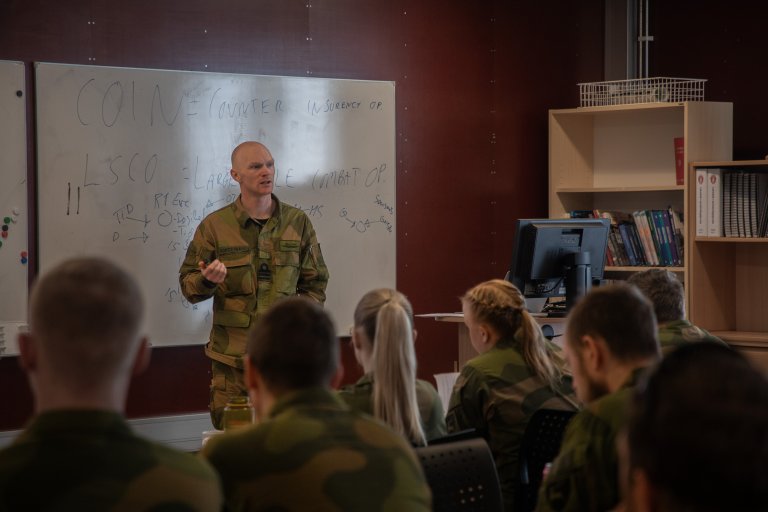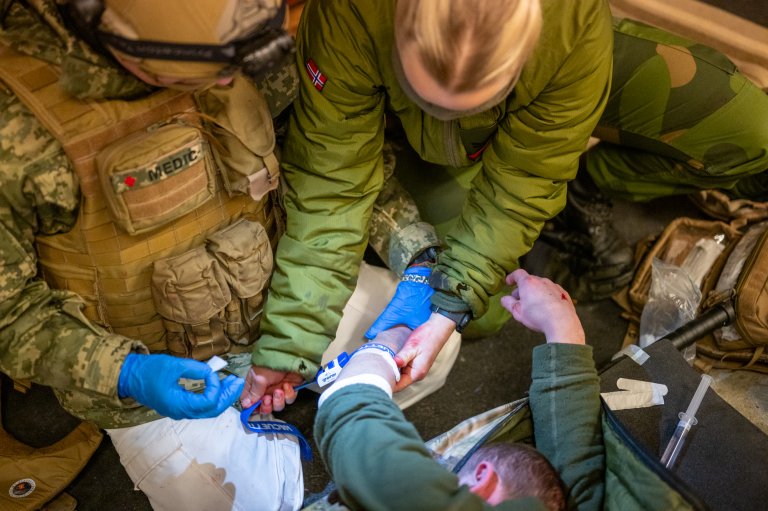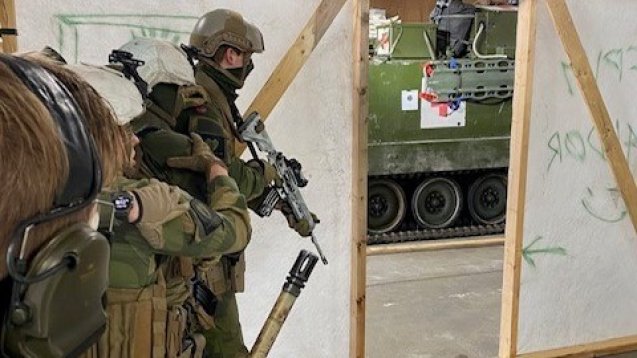
Operational Resilience Training (ORT) – Education for a More Resilient Armed Forces
Norway is one of the first countries to have developed a course that is both practical and concrete in helping soldiers cope with stress and psychological strain. The experiences are partly drawn from Ukraine.
The history of ORT (Operational Resilience Training) dates back to around 2018, when the head of research and development in military psychology/psychiatry at the Norwegian Armed Forces Joint Medical Services, Andreas Nordstrand, established a collaboration with the Walter Reed Army Institute of Research (WRAIR). WRAIR is the largest military research institution in the United States focused on health. They work on research projects, including the development of the Ebola vaccine, and have a dedicated center for military mental health. This collaboration gave Andreas insight into how to translate psychiatric and clinical psychology into practical, trainable methods for soldiers.
"I began working closely with WRAIR, and we collaborated on developing the iCOVER and ReSTART programs to manage acute stress reactions in combat. iCOVER/ReSTART is now an integral part of the ORT course, and it is this skills-based approach to military psychology and psychiatry that we have implemented in ORT", explains Andreas.
The collaboration between the Norwegian Armed Forces Joint Medical Services (NAFJMS) and WRAIR eventually led Andreas to go to the US in 2022 for a 2-year PE deployment. Early in this deployment, a request came from Ukraine to NATO to support training in military mental health and stress management as part of the military training provided to Ukrainian soldiers in Europe. Andreas and Haakon Engen from NAFJMS, along with Dr. Amy Adler from WRAIR, agreed to collaborate on developing a comprehensive course, now called ORT, specifically aimed at Ukrainian Combat Medics. The course was designed to help medics become "trench psychologists" – a completely new role for healthcare personnel in combat. At the same time, the medics would learn simple psychological self-help techniques and buddy-aid strategies, which they could then spread to their fellow soldiers, much like basic first aid skills.
"What we have done with ORT is provide medics with a holistic health education. We teach them basic diagnostics and treatment for mental health issues that may arise in combat. In addition, we teach them techniques for personal stress management and buddy-aid, which they can then teach their fellow soldiers to increase their resilience in the face of the intense stress challenges war entails. This is an important part of the course model because the medic is on the frontline for health in combat and must have tools for both physical and mental first aid", says Andreas.

A course model that attracts international attention
ORT has quickly become a sought-after education, not only in Norway but also among allied forces. Several NATO countries have received the course and expressed interest in gaining access to the training, and the Norwegian program is now recognized as one of the most thorough and realistic of its kind.
"We have had requests from several countries to assist with training. ORT is developed with a high level of realism, where we use both live training and scenario exercises that really put the skills to the test", says Andreas.
It is precisely this balance between theory, practice, and stress management that makes ORT a unique course.
"We put participants under pressure, test how they handle unpredictable situations, and see how well they can apply their skills in chaos".
The course is therefore demanding. There is a lot to learn in just a few days, and at the same time, students must master many different stress scenarios to get practical experience in mastering the stress management techniques they are learning.
"Previously, psychiatrists and psychologists have not had a tradition of making their field more practical and easier to spread. That’s exactly what we’ve done with ORT. Many soldiers have never been trained to handle mental stress in an operational environment, and soldiers with combat experience, for example from Afghanistan, often emphasize that such skills are extremely important in battle".
Important course for knowledge exchange with Ukraine
In the spring of 2023, the ORT program began to play an important role in the Norwegian Armed Forces' education, particularly in cooperation with the Ukrainian military, which faces very demanding situations on the battlefield.
"In the spring of 2023, we began training Ukrainian soldiers in various specializations as part of Operation Gungne, and one of these was Combat Medic. From the start, we integrated the ORT course into this training. The soldiers received two full days of theory and one day of practical field exercises. This early integration allows participants to apply the skills learned in ORT directly to the other parts of their training", says Andreas.
The Ukrainians have been very pleased with the ORT training, while also providing valuable feedback on what works and what doesn’t from their own experiences. This has led to the further development of the ORT education, making it even better with direct experiences and results from the war in Ukraine.
Andreas shares that they have been told to prepare to implement the ORT program across the Norwegian Armed Forces. The team is now working on translating the course to NATO standards, as it has previously only been delivered to the Ukrainians.

First course for Norwegian personnel completed
Recently, the first ORT instructor course for Norwegian personnel was held at Rena, marking a milestone for the program in Norway.
"This was the first time we conducted a five-day instructor course for Norwegian personnel. The course is designed to enable participants to deliver ORT courses to medics and soldiers in the Army. The personnel who participated were professional soldiers from the Medical Battalion, including Combat Medics and nurses with extensive experience in medical services," explains Andreas.
"For us, this was a bit of a 'proof of concept' that the ORT concept can work among our Norwegian soldiers. What I noticed was that the students in the Norwegian instructor course were particularly receptive and grasped the material quickly, allowing us to go even deeper into the subject than I had expected".
The purpose of this instructor course is to make Norwegian personnel self-sufficient in ORT competencies so that they can pass on the knowledge within the Armed Forces. According to Andreas, this will lead to a significant increase in preparedness and resilience within the Norwegian Armed Forces.
"The goal is to have between 50 and 60 ORT instructors in the Norwegian Armed Forces after the next courses. This will provide a much greater spread of knowledge and thus increase the mental resilience among the soldiers. We see that this can make a big difference in a short time, especially when it comes to stress management and combat endurance in high-stress situations", he says.
The soldiers from the Medical Battalion who participated in the first Norwegian course also strongly believe that the ORT course will have positive effects on the Armed Forces. One of the participants, a soldier with ten years of experience and contributions to international operations, believes that if soldiers are given this course early, it can act as a catalyst for all other training. This would make soldiers more resilient and improve results in other areas.
"I think the course is extremely well put together. What really supports the course is that they can show direct results from the war in Ukraine. I’ve personally used stress management techniques in international operations with good effect. Now that I have more knowledge about the subject and more tools to use, it makes me stronger", he says.
The troop sergeant in the unit who attended the course is also optimistic about the effect the course will have:
"I believe it can help increase the combat endurance of TMBN HRS (Telemark Battalion's rapid reaction force) when we spread the knowledge across the unit. This will be beneficial both before, during, and after operations because the course includes knowledge and measures for both everyday situations and more stressful situations encountered during operations".

To be implemented in the Norwegian Armed Forces
"There is no doubt that we are on our way to becoming world leading in this area. We are one of the first countries to have developed a course that is both practical and concrete in helping soldiers handle stress and mental strain," says Andreas.
With its combined insights into operational medicine, military mental health, and practical training, the ORT program is set to make a significant impact.
Facts about the ORT course:
The ORT course is divided into several modules, where participants undergo intensive training in areas such as:
- Basic knowledge of stressors and stress reactions.
- Psychological stabilization and treatment of stress reactions in operational environments – how to provide psychological first aid under pressure.
- Tactical evacuation and reconditioning of soldiers with severe stress reactions – methods for getting soldiers with stress reactions back into service as quickly as possible.
- Personal stress management and buddy-aid under extreme conditions – training to handle chaotic situations.
- Techniques to enhance team cohesion and social support in extreme situations.
- Mental techniques for handling casualties.
- Skills for coping with loss and grief reactions under operational conditions.
- Use of realistic scenarios – training with actors, special effects, and advanced simulation equipment to set up effective stress management training scenarios.
